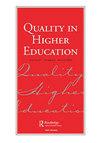格鲁吉亚高等教育的去苏维埃化:解构不自由
IF 1.5
Q3 EDUCATION & EDUCATIONAL RESEARCH
引用次数: 0
摘要
苏联的遗产使格鲁吉亚的大学在地区和全球都处于边缘地位。在后苏联时代,一些格鲁吉亚知识分子在他们的大学里寻求机会,提高创造力、开放性和国际合作,以促进欧盟一体化;然而,另一些人则怀念在严格控制和孤立的学术界范围内不受挑战的权威和等级制度。这两股力量引发了一些重要的问题,即教授在影响改变方面的作用,这些改变将加强地方与欧洲和全球科学与发展网络的接触。这篇文章介绍了经验丰富的格鲁吉亚教授的见解,他们分享了他们在苏联遗产方面的经验,以及在独立的格鲁吉亚创建一个开放和创新的学术职业的斗争。该研究将去苏维埃化的概念作为一种转型战略,并探讨了使用这一战略来加强全球知识制造领域的学术参与所面临的挑战。本文章由计算机程序翻译,如有差异,请以英文原文为准。
De-Sovietisation of Georgian higher education: deconstructing unfreedom
Abstract The Soviet legacy has kept Georgian universities relegated to a peripheral status regionally and globally. In the post-Soviet era, some Georgian intellectuals sought opportunities to enhance creativity, openness and international collaboration at their universities for European Union integration; however, others nurtured nostalgia for unchallenged authority and hierarchy within the bounds of a tightly controlled and insular academia. These two forces give rise to important questions about the agency of professors in effecting change that would enhance local engagement with the European and global networks of science and development. This article presents insights from seasoned Georgian professors, who share their experience of the Soviet legacy and struggles in creating an open and innovative academic profession in independent Georgia. The research engages the concept of de-Sovietisation as a transformational strategy and examines the challenges of using this strategy to enhance academic engagement in the global domains of knowledge-making.
求助全文
通过发布文献求助,成功后即可免费获取论文全文。
去求助
来源期刊

Quality in Higher Education
EDUCATION & EDUCATIONAL RESEARCH-
CiteScore
3.30
自引率
14.30%
发文量
32
期刊介绍:
Quality in Higher Education is aimed at those interested in the theory, practice and policies relating to the control, management and improvement of quality in higher education. The journal is receptive to critical, phenomenological as well as positivistic studies. The journal would like to publish more studies that use hermeneutic, semiotic, ethnographic or dialectical research as well as the more traditional studies based on quantitative surveys and in-depth interviews and focus groups. Papers that have empirical research content are particularly welcome. The editor especially wishes to encourage papers on: reported research results, especially where these assess the impact of quality assurance systems, procedures and methodologies; theoretical analyses of quality and quality initiatives in higher education; comparative evaluation and international aspects of practice and policy with a view to identifying transportable methods, systems and good practice; quality assurance and standards monitoring of transnational higher education; the nature and impact and student feedback; improvements in learning and teaching that impact on quality and standards; links between quality assurance and employability; evaluations of the impact of quality procedures at national level, backed up by research evidence.
 求助内容:
求助内容: 应助结果提醒方式:
应助结果提醒方式:


